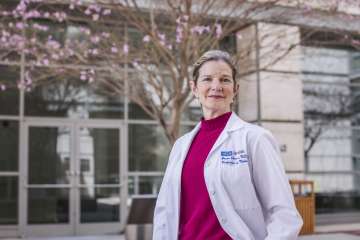Before he got sick in June 2020, Ruben Salazar was a happy, easygoing guy. The 43-year-old father of two took pleasure in playing with his kids in the park near their home in Los Angeles, working out and his job at a health-supplement company. “I’m a Cancer, a water sign, so I just go with the flow,” Salazar says.
Then he caught COVID-19 and became a “long-hauler” — a member of an unfortunate club that includes countless people around the globe who have gotten the coronavirus and recovered from their acute infection but who still suffer lingering health issues in the aftermath of the virus.
Salazar was hospitalized for 10 days, including four that he spent in the ICU in a medically induced coma on a ventilator. Now, nearly a year later, he struggles with anxiety, mood swings and the impaired concentration, forgetfulness and blurry thinking commonly called “brain fog.” He suffers from recurrent nightmares, says he’s more aggressive than ever before — “I speak what I need to speak out,” he says — and has been diagnosed with anxiety and post-traumatic stress.
“Now, I’m talking to a psychiatrist,” he says. The fatigue that left him winded from even the slightest physical activity when he was first discharged from the hospital has mostly subsided. He feels a bit more energetic but still has trouble breathing when he exerts himself. Doctors cleared him to return to work, but only part-time, because of his ongoing cognitive and psychological issues, which Salazar says only compounds the stress that he feels as the family breadwinner. “I do find myself more frustrated nowadays than before I was sick,” he says. “I was a more patient guy, but now I get mood swings, and I fall into depression, and then I kind of exclude myself from people.” He stops for a moment, quiet. “I’m not the Ruben I used to be,” he says.
AS THE EXPANDED ROLLOUT OF VACCINES POINTS TOWARD THE HOPED-FOR END OF THE PANDEMIC , scientists are increasingly focused on understanding and treating long-hauler patients like Salazar. Multiple studies are underway at UCLA and other institutions across the country to determine the range of symptoms that constitute what has been termed “long COVID,” how long they might persist and what, potentially, can be done to prevent or alleviate them.
“This is a phenomenon that is really quite real and quite extensive,” Anthony Fauci, MD, director of the U.S. National Institute of Allergy and Infectious Diseases, said in December 2020 at a national workshop about the condition. Given the more than 115 million confirmed COVID cases around the globe and the nearly 30 million in the United States, “Even a small proportion with post-acute sequelae are going to represent a significant public health issue,” Dr. Fauci said.
Physicians and researchers are turning to patients to find answers. COVID-19 survivors with continued symptoms are the ones who coined the terms “long-hauler” and “long COVID” in online support groups early in the pandemic.
A preprint study released in December surveyed nearly 3,800 members, from 56 countries, of a COVID-19-survivor group called Body Politic to better understand the range, frequency and duration of their symptoms. It found that 85% of those surveyed experienced cognitive dysfunction, and 77% reported memory problems. Emotion and mood changes affected 88% of respondents. Fatigue was the most common symptom, affecting more than 98% of survey respondents. Only 27% of respondents had returned to their pre-illness work schedules. Researchers estimate that at least 10% of people infected with COVID-19 could become long-haulers, with symptoms that continue for three months or more.
An article this past summer in The Atlantic cited similar studies around the world that reached equally disturbing conclusions: An Italian study found that 87% of hospitalized patients still had symptoms after two months; a British study found similar trends; a German study that included many patients who recovered at home found that 78% had heart abnormalities after two or three months.
A more recent study published in The Lancet in April 2021 found that a third of more than 236,000 coronavirus patients surveyed received a neurologic or psychiatric diagnosis within six months of recovery from COVID-19. The number was even higher — 42% — for COVID-19 patients who were treated in intensive care.
The U.S. Centers for Disease Control and Prevention is trying to learn more through its nationwide, multisite INSPIRE (Innovative Support for Patients with SARS-CoV-2 Infection Registry) study that launched in December. The effort, which is led at UCLA by Joann Elmore, MD, MPH, professor of medicine in the David Geffen School of Medicine at UCLA, aims to collect health records from thousands of Americans who have been tested for COVID-19 infection and survey them quarterly for 18 months to look for clues about lingering symptoms. In a recent article in The Washington Post, Dr. Elmore addressed the impact of the condition on women in particular. “I hope going forward that physicians will treat symptoms of both male and female patients with respect,” she said. “Historically, there have been both gender and racial biases. I worry that patients with real disease may not be taken seriously.”

Many questions remain to be answered. “We don’t yet know how common it is for individuals to experience long-term health issues after COVID-19 infection, which makes it harder to look out for specific signs and symptoms,” Dr. Elmore says. There are those who think that long COVID only affects patients like Salazar who have been seriously ill and intubated in an ICU. But, Dr. Elmore says, ongoing symptoms also are showing up in patients who are young and otherwise healthy and have had only mild cases of COVID-19. “I have to admit, as a physician, that scares me,” she says. “If we want to be able to prevent and treat long-haul symptoms, we need more data.
The symptoms of long COVID are as varied as the people who are afflicted. Some long-haulers were hospitalized during their acute infection; others, as Dr. Elmore notes, had milder illness but never fully recovered. A preprint study released in March found that asymptomatic infection can also result in lingering symptoms. An analysis of medical records from 1,400 University of California patients who tested positive for coronavirus revealed post-COVID complaints of shortness of breath and chest pain that persisted for at least two months, even among those who had never felt sick during acute infection. The range of post-COVID experiences also includes prolonged anosmia (loss of sense of smell), heart palpitations, cough, fatigue, hair loss and the depression and brain fog Salazar is still facing.

The brain fog and other neurological symptoms Salazar has been experiencing may be associated with post-traumatic stress, says Andrew Levine, PhD, clinical professor of neurology. He recently coauthored a paper that found similar symptoms in survivors of SARS and MERS, two previous coronavirus infections. “Individuals who suffer serious COVID-19 often are put in the ICU on mechanical ventilators and experience delirium,” Dr. Levine says. “Those conditions and treatments themselves, even outside the context of COVID, can lead to post-traumatic stress.”
That stress can be exacerbated by the barrage of news coverage about the disease. “There’s certainly a kind of neurosis that arises from everyone’s knowledge about this illness and all the reports of long-haulers having lasting symptoms,” Dr. Levine says.
SINCE HE WAS DISCHARGED FROM UCLA IN JULY, Salazar has been under the care of multiple physicians. He was first treated after being discharged at UCLA’s Post-ICU Recovery Clinic, which opened in February 2020 and quickly became a de-facto post-COVID-19 clinic. Staffed by multidisciplinary experts — including critical-care doctors, pulmonologists, occupational therapists, physical therapists and social workers — the clinic was created to help patients transition from the ICU to home recovery. “They get such intensive care in the hospital and have this near-death experience, and then they’re discharged — usually with many new diagnoses, including new pulmonary conditions, significant weakness, cognitive dysfunction and the risk of other psychiatric conditions — and are often left to fend for themselves at home,” says Kristin Schwab, MD (RES ’16, FEL ’20), a founder of the Post-ICU Recovery Clinic. “We really envision this clinic as a way to bridge them back to their primary care doctor and their normal lives.”

Salazar is still waiting for normal life to resume. Physically, he says he’s getting there. On top of COVID-19, he came out of the hospital with diagnoses of hypertension and diabetes, and has since improved his diet significantly. “Before I got sick, I was feeling the symptoms of being diabetic, but I was in denial. I didn’t want to believe it,” he says. “But you know what? It almost cost me my life to understand it, so now I take that as most important in my life. It’s my chance to get myself back to being healthy.”
Psychologically, though, Salazar is still in unfamiliar territory. “Sometimes I forget things. And before, that was never an issue. I was always, always sharp on my memory. But now, even when I test my blood, I see the number and forget instantly,” he says. “And, sometimes, I just lose concentration and my mind wanders off.”
He finds himself newly short-tempered. But most troubling is the depression and anxiety that cause him to isolate and withdraw from his wife and children.
“For me to go through these emotions that I’ve been going through, it’s like a roller coaster, and it’s something I’ve been dealing with since I’ve been sick,” Salazar says. “And it’s just like, when is it going to be right again? When am I going to be back to normal?”
Helen Lavretsky, MD (RES ’95, FEL ’96), professor-in-residence in the Department of Psychiatry and Biobehavioral Sciences in the Jane and Terry Semel Institute for Neuroscience and Human Behavior at UCLA and an integrative geriatric psychiatrist at the Stewart and Lynda Resnick Neuropsychiatric Hospital at UCLA, hopes that she can help long-haulers with their cognitive and psychiatric symptoms. She established a new clinic that is working in concert with the Post-ICU Recovery Clinic to treat long-COVID patients with therapies that have been found in her research on geriatric depression to be effective.
“Neuropsychiatric symptoms are a big part of the picture post-COVID and include chronic fatigue, depression, anxiety, PTSD, insomnia and brain fog,” Dr. Lavretsky says, adding that research shows that the inflammatory and vascular response to the virus affects multiple organs. “A lot of these changes are vascular and inflammatory in nature.
“The brain is one of many organs that are damaged by COVID-19 infection, with resulting vascular and inflammatory changes,” Dr. Lavretsky says. “After the virus is no longer found in tissues, the inflammatory reaction persists and leads to cognitive and neuropsychiatric symptoms.”
Even before the pandemic, scientists hypothesized that neuroinflammation might contribute to depression, fatigue and cognitive dysfunction. “These symptoms lead to disability. And the worst thing is, nobody really knows how to treat it, or whether or not it’s time-limited,” Dr. Lavretsky says. “Symptoms such as anxiety and depression can be the product of COVID — of this inflammatory response and brain changes — but it also could be a reaction to this new disability and uncertain future.”

Dr. Lavretsky’s research with older adults with treatment-resistant depression has included trials using Ritalin, the drug often prescribed for attention-deficit hyperactivity disorder, and memantine, a medication used to treat symptoms of Alzheimer’s disease, as well as mind-body therapies such as yoga, meditation and Tai Chi. These interventions have “neuroplastic, neuroprotective effects on symptoms of apathy, anxiety and depression, as well as cognitive impairment,” she says, making them potentially effective treatments for the psychiatric and cognitive symptoms experienced by long-haulers.
“I’m motivated to try these therapies that have been proven in older adults for post-COVID patients,” she says. “Society globally will be dealing with this disabling condition for years to come, and that’s my motivation to have this clinic. Long COVID is a real thing. It’s very disabling, and countries will be dealing with the financial fallout from millions of people being disabled like this.”
Salazar, despite his ongoing challenges, is motivated, too. “I’m going to try to beat this and overcome all my anxieties and try to overcome everything,” he says. “That’s one of my strong goals right now.”
He is hopeful that science will provide solutions for the condition that continues to plague him and millions of other COVID-19 survivors months after their original illness. “If I have issues,” Salazar says, “I hope they have answers for them.”


